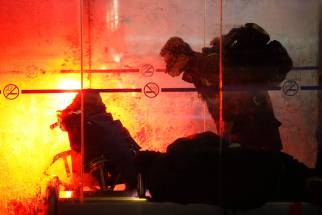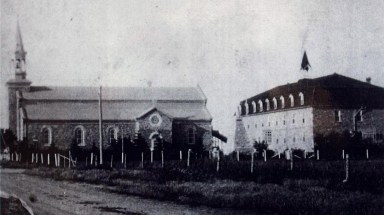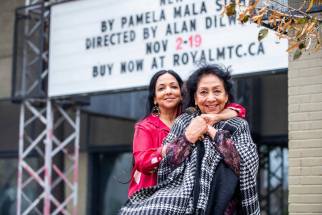Minding the gap Toronto-based playwright Pamela Mala Sinha mines family history to tell story of overlooked generation of new Canadians
Read this article for free:
or
Already have an account? Log in here »
To continue reading, please subscribe:
Monthly Digital Subscription
$0 for the first 4 weeks*
- Enjoy unlimited reading on winnipegfreepress.com
- Read the E-Edition, our digital replica newspaper
- Access News Break, our award-winning app
- Play interactive puzzles
*No charge for 4 weeks then price increases to the regular rate of $19.00 plus GST every four weeks. Offer available to new and qualified returning subscribers only. Cancel any time.
Monthly Digital Subscription
$4.75/week*
- Enjoy unlimited reading on winnipegfreepress.com
- Read the E-Edition, our digital replica newspaper
- Access News Break, our award-winning app
- Play interactive puzzles
*Billed as $19 plus GST every four weeks. Cancel any time.
To continue reading, please subscribe:
Add Free Press access to your Brandon Sun subscription for only an additional
$1 for the first 4 weeks*
*Your next subscription payment will increase by $1.00 and you will be charged $16.99 plus GST for four weeks. After four weeks, your payment will increase to $23.99 plus GST every four weeks.
Read unlimited articles for free today:
or
Already have an account? Log in here »
Hey there, time traveller!
This article was published 01/11/2022 (1143 days ago), so information in it may no longer be current.
It’s the early 1960s. A young bride steps off a plane in Montreal and at first she doesn’t recognize her husband because he’s wearing a suit and a beret, and she was imagining him as they’d met at home in India.
That night, she looks at the swirling white outside, and in her exhaustion remarks how dusty it is in Canada. She doesn’t really know snow.
Theatre preview
New
By Pamela Mala Sinha
● Tom Hendry Warehouse Theatre
● Opens Saturday, runs to Nov. 19
● Tickets at royalmtc.ca
The next day her husband takes her to Winnipeg, where he’d been hired as a professor at the University of Manitoba. They settle into an apartment on River Avenue, beside a small park. Their marriage had been arranged, so they’re learning this new country the same way they are learning each other, which is to say, it will take some time.
There aren’t many South Asian people in Winnipeg just then, and the young bride doesn’t speak much English. She spends most days alone. For the first month, she sits at the window of that River Avenue apartment and stares out at a city covered in snow, wondering how to carve a space in it big enough for a life she can call her own.
Before moving to Canada, she’d been a renowned Indian classical dancer. She’d spent three years touring India with Uday Shankar’s famed troupe, and dance was her world. Now, there are no more rapt audiences and no more shows. She dances alone in her living room while she vacuums. She calls home, but has to yell over crackling phone lines.
“Can you hear me? Can you hear me?”
She knows about the Red Cross. One day she calls its number; when a volunteer answers and asks, “Can I help you?” the bride manages just one word, “Lonely,” and then starts to cry.
The Red Cross volunteer comes over to her apartment to comfort her, and invites her to one of their facilities to play with the children, and that helps a little bit.
But the depression lingers and within a year her husband says, “You can’t live like this.” She goes back to Calcutta, though her father won’t let her stay: your place is with your husband, he insists. She doesn’t want to go, but then her mother gives her words that will stick with her for a very long time: “You can conquer that place.”
MIKAELA MACKENZIE / WINNIPEG FREE PRESS Playwright Pamela Mala Sinha (right) was inspired by her mother Rubena Sinha’s story of coming to Winnipeg in the 1960s.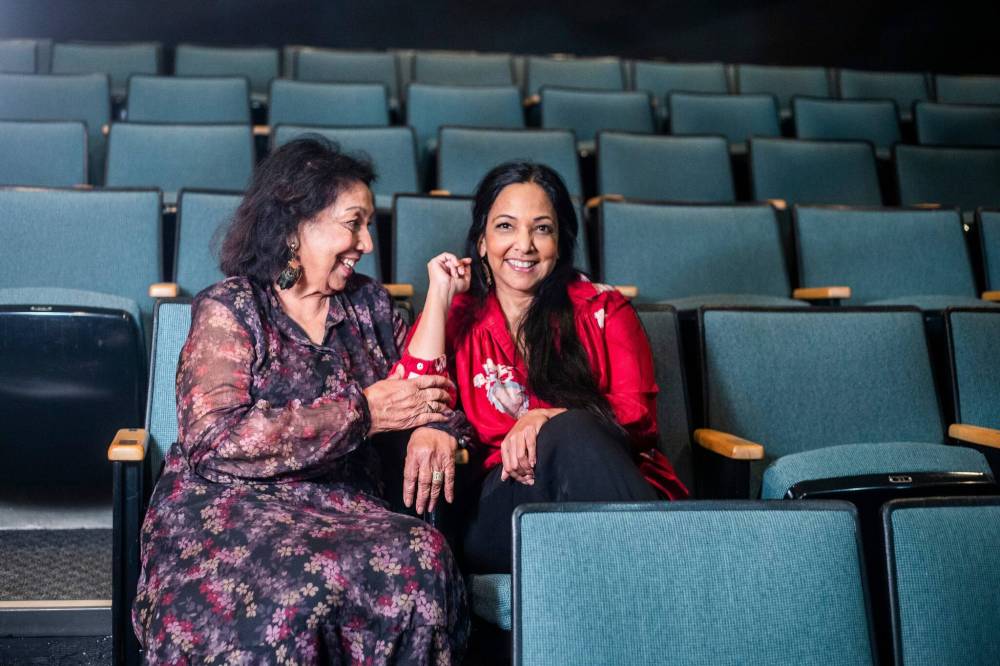
It’s then that the bride thinks, no, I won’t give up. And she goes back to Winnipeg and she starts to build a life, not just for herself, but for her husband, and later for their two children, and also for all the others that are making the same trek over the ocean, the first vanguard of a South Asian community that will someday grow to more than 25,000 people.
They make their own families, these young newcomers. They throw parties in basements, Hindus and Sikhs and Muslims and Christians all together. They adopt each other as something beyond friends; they call each other “sister” and “brother.” And they are growing up together, as all young people do, learning how to stand on their own.
Bit by bit, they connect with the city. One day, the young bride walks into the Royal Winnipeg Ballet and introduces herself to the curious people there as, simply, “dancer.” She makes friends there, who provide her entry into Winnipeg’s growing arts scene; one of them will later co-found the groundbreaking Fusion Dance Theatre company here with her.
Nearly 60 years later, that young bride has matured into an elegant, soft-spoken woman. Her name is Rubena Sinha and she is sitting in the lobby of the Tom Hendry Warehouse Theatre, along with her daughter. She lives in Toronto now, but her name still reverberates here as an artist, a choreographer, a nationally acclaimed storyteller.
“Winnipeg gave me my life.”–Rubena Sinha
“Winnipeg gave me my life,” she says.
Could she ever have imagined saying that, back in those early days staring out the window at a frozen, impenetrable city?
“No, not at that time,” she says, with a warm smile and a shake of the head. “At that time, I couldn’t even think of it.”
There’s a bigger story here. Not specifically Rubena’s, or anyone in particular’s. A story about a place, a time, and threads of life that were woven together into something new. Now, in a brand-new theatre work, her daughter has set out to tell it.
In 2014, Pamela Mala Sinha’s uncle, Shibdas Biswas, died. He was not really her uncle, not by blood, but he had been one of those first newcomers from India to make his way to Winnipeg in the 1960s. Pamela’s parents considered him a brother and their kids had all grown up together, so when he died, it was “like I’d lost another father,” Pamela says.
When she came back to Winnipeg for the funeral, Pamela, an actor and playwright (her work Happy Place played at Prairie Theatre Exchange in 2018) who now lives in Toronto, began looking through old photo albums. The images leaped off the page: here were her parents and their friends in the early days, sipping scotch, laughing, dancing. Here were snapshots of how they built their lives and their community in Canada.
“They were young here,” she thought.
MIKAELA MACKENZIE / WINNIPEG FREE PRESS Rubena Sinha (right) serves as a cultural consultant on her daughter Pamela Mala Sinha’s play New, which explores the free-wheeling side of the South Asian immigrant experience.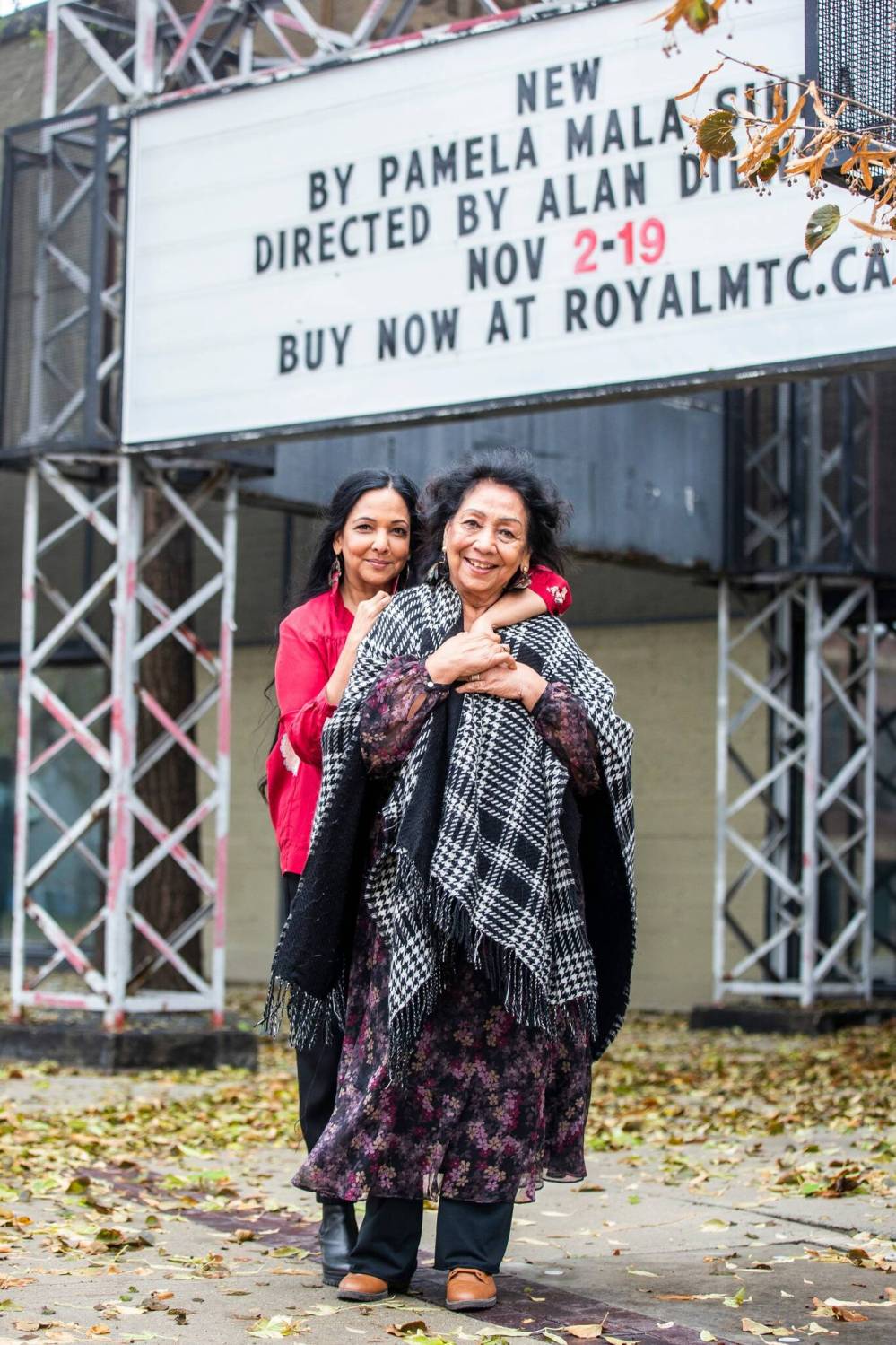
Flash forward to 2017. She’d just been awarded a commission from Toronto-based theatre non-profit Soulpepper to create new work, and she wanted to write about her parents. There was a gap, she thought, in the pop cultural record of the South Asian immigrant experience.
Many stories that get told focus on the children who grew up in Canada or the United States. Their parents often enter the narratives in a more limited way. They’re not given the same space to be fully realized as people who’d lived rich, varied lives; they don’t often get to be young, in the stories.
“They’re kind of the butt of the joke, they’re these side characters,” Pamela says, chatting during a break from rehearsals last month. “That’s not what my parents were. They were brave, and courageous. They weren’t like as they seem to be constantly represented in popular culture. So that’s also been in my head.”
Inspired by the photos, Pamela began to ask her mother about those days in more depth, but Rubena had another idea. If she wanted to write a play about that generation, Rubena said, then they had to go back to Winnipeg. They had to go meet those old family friends and hear their whole story, from their first taste of Canada to their first married fight.
In other words, the playwright had to hear not just what Rubena and her friends did in their youth, but also how it all felt.
“It’s not just, ‘Oh, this is a fun scene’ or ‘That would be a good story,’” Pamela says. “You have to go from a place of research, and I did, I really did, because I wanted to get it right. There’s such a huge gap in our narrative. We don’t see them as young people, and it’s not the same as a new immigrant now. It’s a very particular time in our history.
“And that, if I’m going to represent it, it’s a big responsibility.”
“It’s really about love, loneliness, the joyfulness of community but also the piercing loneliness of isolation, and negotiating marriage, negotiating love, negotiating sexual dynamics.”–Pamela Mala Sinha
Soon, those conversations would breathe life into Pamela’s third play. It’s called, in perfect simplicity, New.
The work — which is directed by Alan Dilworth and stars Omar Alex Khan and Mirabella Sundar Singh — is set to première on Saturday at the Tom Hendry Warehouse and runs through Nov. 19. It entwines the stories of seven characters, including one, Sita, performed by the playwright herself, following them as they navigate their new worlds, not only of Canada, but of universal horizons: how to live, how to love, who they are becoming.
“It’s really about love, loneliness, the joyfulness of community but also the piercing loneliness of isolation, and negotiating marriage, negotiating love, negotiating sexual dynamics,” Pamela says. “All of that kind of stuff that is present within any marriage, that is present particularly when you’re thousands of miles away.”
Yet though some details are taken from life, New is not, to be clear, Rubena’s story or that of her friends specifically; it’s not biographical. The play’s characters are entirely fictional — that part should be stressed, given the intimate stories of sex and relationships the script explores — and nobody Pamela spoke to will recognize themselves onstage.
But the characters do capture an essence of a place and time, and the path to a self-made sort of belonging.
MIKAELA MACKENZIE / WINNIPEG FREE PRESS Playwright Pamela Mala Sinha (left) and her mother, Rubena Sinha, outside the Tom Hendry Warehouse Theatre, where Pamela’s play, New, debuts on Saturday.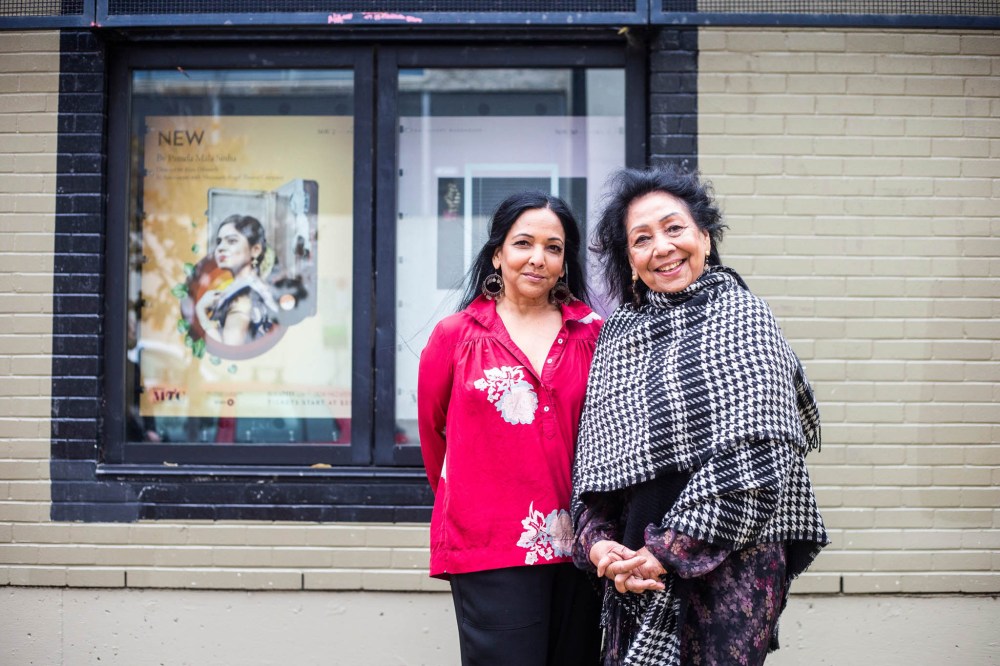
To bring it to life, Pamela brought her mother into the production. Rubena serves as a cultural consultant on the play, and wrote some of her own life story for its program. And the playwright plucked inspirations like gems from some of those old family photos and the discussions that unfurled around them.
Sitting in the Warehouse theatre’s lobby, Pamela gestures at a black-and-white photo of Rubena lying on a bed, head resting on her hand. She’s wearing a perfectly arranged sari and she looks incredibly bored. Rubena nods; she doesn’t quite remember where that one was taken, she says, but she used to get “bored to death” in the early days here.
“But you’re all dressed up, because you’re a new bride,” Pamela says.
Her mother waves off that suggestion.
“Our saris always look like dressed up,” she says. “They were all beautiful. They were all silk, and when you get married, they give you more silk, not so much cotton or other things. So all my saris looked like I was going somewhere, but I wasn’t. I was at home, or sitting there waiting for him. So it looked like that.”
So conversations like that worked their way into New’s script: there’s a part in the play where a young husband looks at a wife wearing a sari and tells her she doesn’t have to dress up, that she can just wear normal clothes. She replies that what she’s wearing is normal.
There are other bits and pieces from life. The phone lines to India that barely worked, the bachelors who always showed up for dinner. Sometimes, Pamela would ask her mother about a scene she’d written; if it wasn’t a realistic portrayal, it got cut. The result is a story that gives her parents’ generation a narrative depth that hasn’t always been granted them.
“I was so proud of it, because nobody talked about us like this,” Rubena says. “I was very proud of that.”
Performances of New scheduled for tonight through Friday have been cancelled owing to a positive COVID-19 test. Ticketholders may rebook for a different performance, receive a refund, or donate the price of the ticket.
melissa.martin@winnipegfreepress.com
Our newsroom depends on a growing audience of readers to power our journalism. If you are not a paid reader, please consider becoming a subscriber.
Our newsroom depends on its audience of readers to power our journalism. Thank you for your support.


